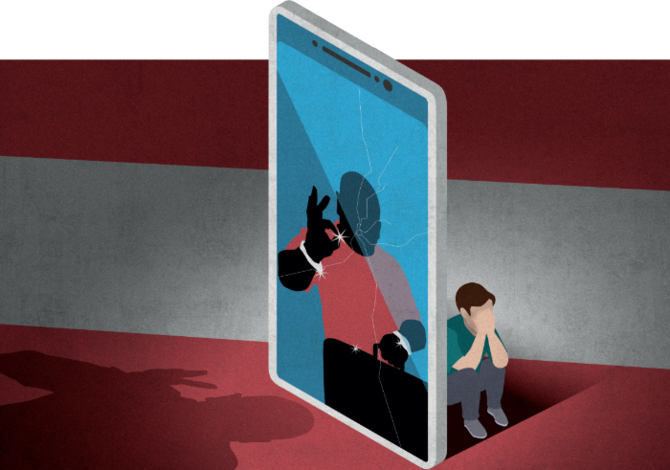DUBAI: Less than a year since the rape and murder of six-year-old Leen Talib in a case that shocked Lebanon, the country has again been rocked by a scandal involving the sexual abuse of children, and this time the social media platform TikTok is caught up in the furore.
Lebanese authorities are investigating a group of 28 to 30 individuals who allegedly used the app to groom children into performing indecent acts. The acts were reportedly filmed for sale online.
Nine suspects have so far been arrested, including TikTok influencer George Moubayyed, who owns a hair salon called Hair Zone in Beirut’s Sabtieh neighborhood, alongside three minors who allegedly used their accounts to lure others.
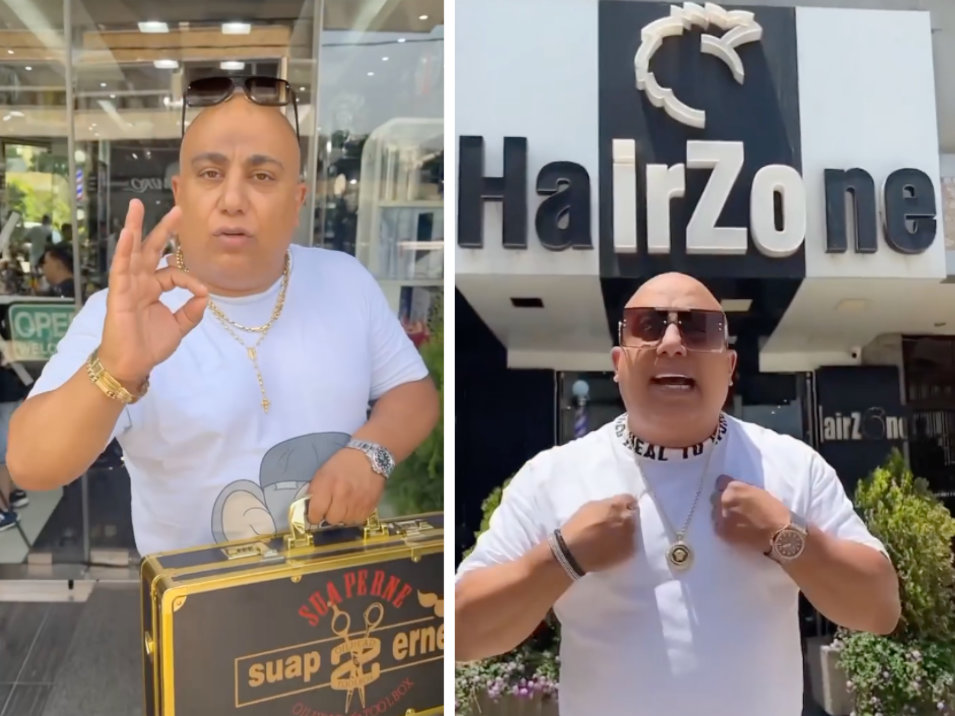
These images from social media influencer George Moubayyed's TikTok account shows himself posing in front of his salon in Beirut’s Sabtieh neighborhood. (Supplied)
According to local news media, the gang includes men and women and includes several Syrian and Turkish nationals.
The allegations have provoked outrage across Lebanon and have led to calls for TikTok to be banned in the country.
The Lebanese Internal Security Forces released a statement saying the arrests took place after several children reported being sexually assaulted on camera by members of a predatory gang and being forced to partake in drug use at hotels and seaside chalets.
One teenager, who cannot be named for legal reasons, told Arab News that he was groomed by the gang, but was able to avoid being sexually assaulted.
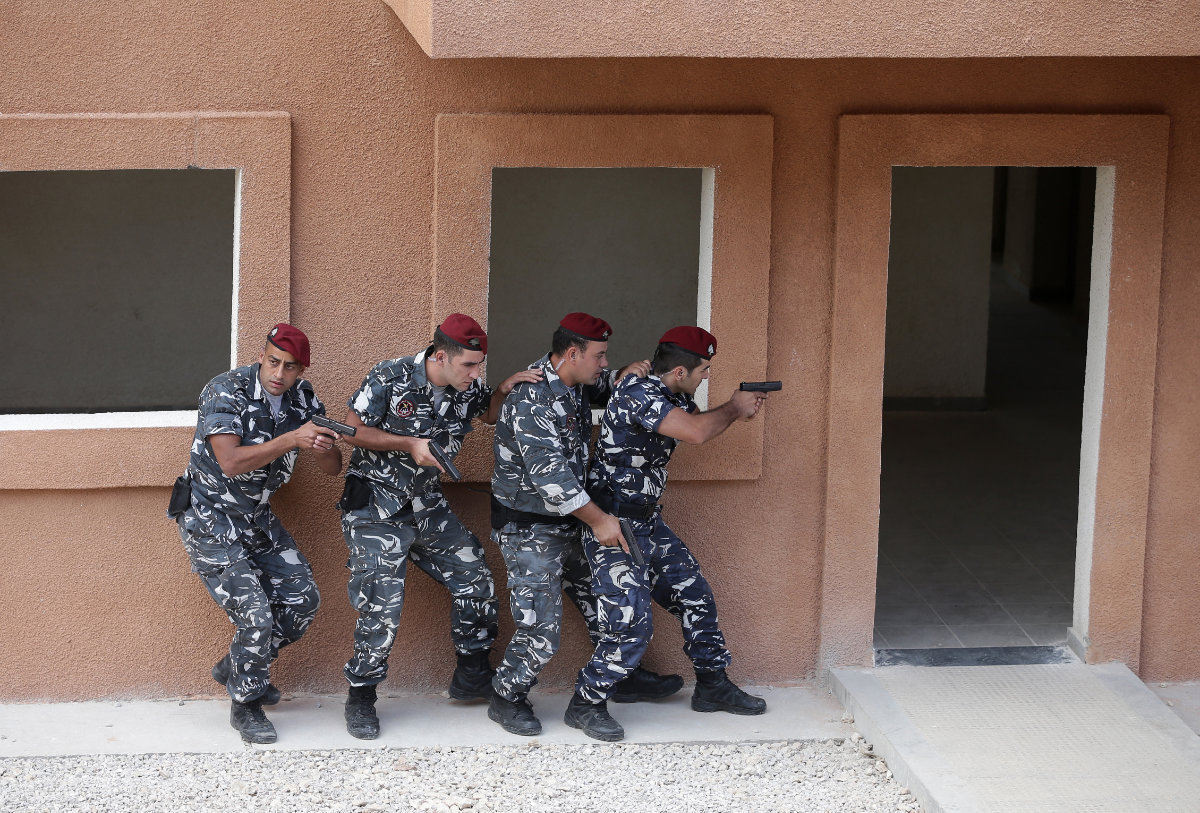
Lebanon's Internal Security Forces had been busy lately trying to suppress the burgeoning drug and arms smuggling trade in Lebanon, and now massive human trafficking and rampant exploitation of minors. (AFP/File photo)
“A few months after I opened my TikTok account, I was sent a message from an account which, at times, would call itself The Agency,” the teenager said. “They explained that they recruit children my age — 15 to 16-year-olds — to publish funny videos that get monetized, and I would receive any money the videos made. There was no (hint) of anything predatory at first.
“That soon changed, however. I started receiving texts from random accounts of a flirtatious nature. I was approached by an anonymous elderly man whose texts would range from normal to borderline flirtatious.
“He offered to buy me a new phone and give me $1,500 in cash if I were to meet him. Rather than coming to my neighborhood and meeting at a public place like a restaurant or coffeehouse, the man insisted on sending me a taxi to a private location. I refused. I later (found out) he was friends with one of the men from The Agency gang.”
Arab News could not independently corroborate the teenager’s allegations.
INNUMBERS
• 4.76 million Internet users in Lebanon at the start of 2024.
• 3.92 million TikTok users in Lebanon, mostly in 8-24 age group.
• 1.56 billion Monthly active TikTok users globally as of today.
Judicial authorities and local news media have identified several individuals they believe are linked to the gang, including a lawyer registered with the North Bar Association in Tripoli called Khaled Merheb; Abdo Keysso, the owner of Matrix clothing store; dentist Hussein Allaq; Paul Meouchi; Peter Naffah; and Hassan Singer.
Gigi Ghanawi, a social media influencer, proceeded to delete all of her social media accounts after being accused by some Lebanese media outlets of being part of the gang. Her accounts had multiple photos of her posing with the accused.
Some of the alleged victims have also claimed that Ghanawi sent them private messages of a provocative nature, asking to meet up with them, but when they arrived at the scheduled location, they were met by gang members. According to the latest reports, Ghanawi has been arrested.
While the investigation is still in its preliminary stages, Attorney General Judge Tanios Saghbini, the public prosecutor at the Court of Appeal in Mount Lebanon who is presiding over the case, has issued multiple arrest warrants and has requested Interpol’s assistance, as some of the suspects reside abroad — Meouchi is a resident of Sweden, while Naffah has reportedly fled Lebanon.
The teenager who spoke to Arab News said that he was asked to go to a shop called Fashion Zone to pick up the money he was owed from the “funny” videos he had filmed.
“The boutique was situated near George Moubayyed’s Hair Zone salon. You’d have to collect the money in cash. There was no other way to receive it directly. That’s how I came to know Moubayyed.
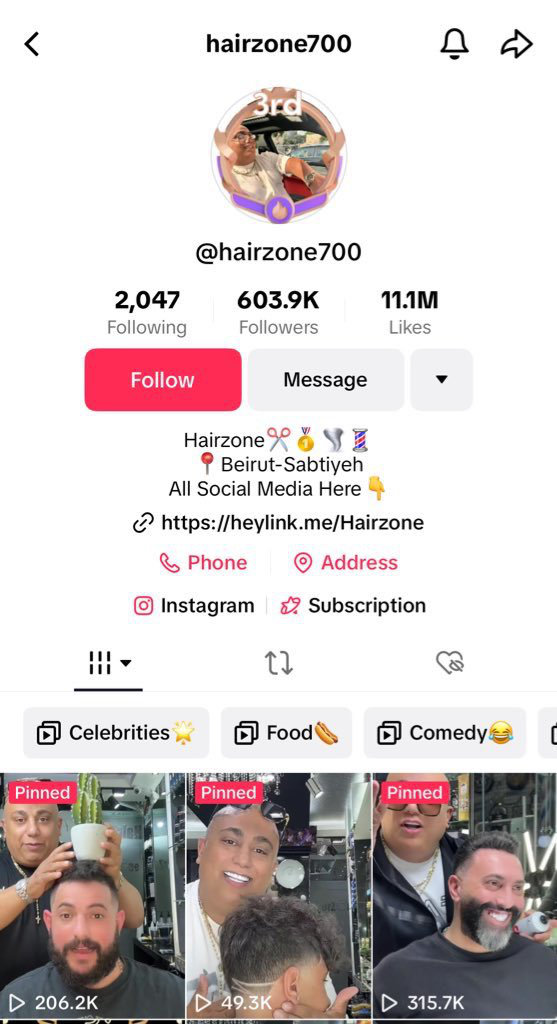
Nine suspects have so far been arrested, including TikTok influencer George Moubayyed, who owns a hair salon called Hair Zone in Beirut’s Sabtieh neighborhood. (Supplied)
“Upon meeting me, he suggested that he should cut my hair on camera, saying he’d do it for free and that it would give me more exposure, on account of him having over 400,000 followers on TikTok. He seemed adamant and pushy about the whole thing, then took my number to schedule a date for the appointment.
“Another time I went, I was introduced to Paul Meouchi. Paul would always try to take me out, often citing that he doesn’t live in town, that he resides in Sweden, and that I should really make the most of it while he’s around. I came to sense they all had that pushy attitude about them. They do not take no for an answer, always (asking) to meet for dinner and drinks.
“At one point, I received private messages from anonymous accounts claiming they had pornographic videos and photos of me and they said they would release them if I did not (meet them at) a certain location. I called their bluff, though. I knew there was nothing of that nature. Once I did that, the account deactivated.”
According to Singer’s testimony, the gang would use the children’s own videos to blackmail them into keeping quiet and continuing to be abused by gang members.
Singer alleges he was approached by other minors in his neighborhood who confided in him, and that he was posing as a pedophile in order to gather evidence and try to bring the offenders to justice

Amid Lebanon's economic and political crises, minors are feared to be most at risk to pedophiles and ghuman traffickers using social media to lure them. (AFP/File)
Despite portraying himself as a concerned citizen, several videos have surfaced on social media that reportedly show Singer in questionable settings with minors.
“I was also contacted by Hassan Singer,” the teenager told Arab News. “Hassan pretended to be a friend. He would often ask me out for lunch. He said I should be warned of bad men who wish to do harmful things to little boys and that I should steer clear of them. He also said he supports children my age by giving them money, which I found to be a little odd.
“One time he suggested that, if I ever needed a dentist, I should go to Hussein Allaq’s clinic. He said that to get a good deal and a quick appointment, instead of calling the clinic, I should message Allaq privately, tell him my age and send him some photos of me.”
The teenager also claimed that he was approached on TikTok by an Arab man who offered him $20 for each pornographic image or video sent.
In a statement, Judge Saghbini said the accused had formed “a criminal network for human trafficking and money laundering” and had “solicited minors, via social media networks, mainly TikTok, for sexual purposes.”

A judge has said that a "criminal network for human trafficking and money laundering” and had “solicited minors, via social media networks, mainly TikTok, for sexual purposes.” (Shutterstock images)
He also said members of the network had forced the minors to take drugs before raping them, had taken nude photos of them for the purpose of sale and distribution, and had engaged in “violent and life-threatening practices.”
According to Lebanese police, the videos and photos were intended to be sold on the dark web — online content that can only be accessed by specific software and usually requires authorization of some kind. While it is not illegal to access the dark web, some of its websites engage in criminal activity, which, according to the International Monetary Fund, includes “arms trafficking, drug dealing and the sharing of exploitative content.”
But what about the clearnet — the publicly accessible online content the majority of people use regularly, and which includes the major social media platforms? Does this latest scandal involving the abuse of such platforms make a case for banning the likes of TikTok?
Popular among the “Gen Z” demographic, TikTok — which is owned by the Chinese company ByteDance — has 1.56 billion monthly active users globally as of 2024, according to market researchers at DemandSage.

Infographic courtesy of DemandSage
It ranks fifth among the most popular social media platforms, and is almost equally popular with men (52 percent of users) and women (48 percent), with the majority of its users aged 18 to 34.
Despite its popularity, its impact on mass culture, and the many small businesses and influencers who depend on it for sales and publicity, the site has faced opposition around the world.
It was banned in India in June 2020 amid tensions with China. Nepal also announced a decision to ban TikTok in November 2023 and Pakistan has implemented a number of temporary bans since 2020.
TikTok is also under pressure in the West because of concerns over data. It has been banned from government-issued phones in the UK, the US, Canada and New Zealand, and staff at the European Commission have also been banned from using it on work-issued devices.
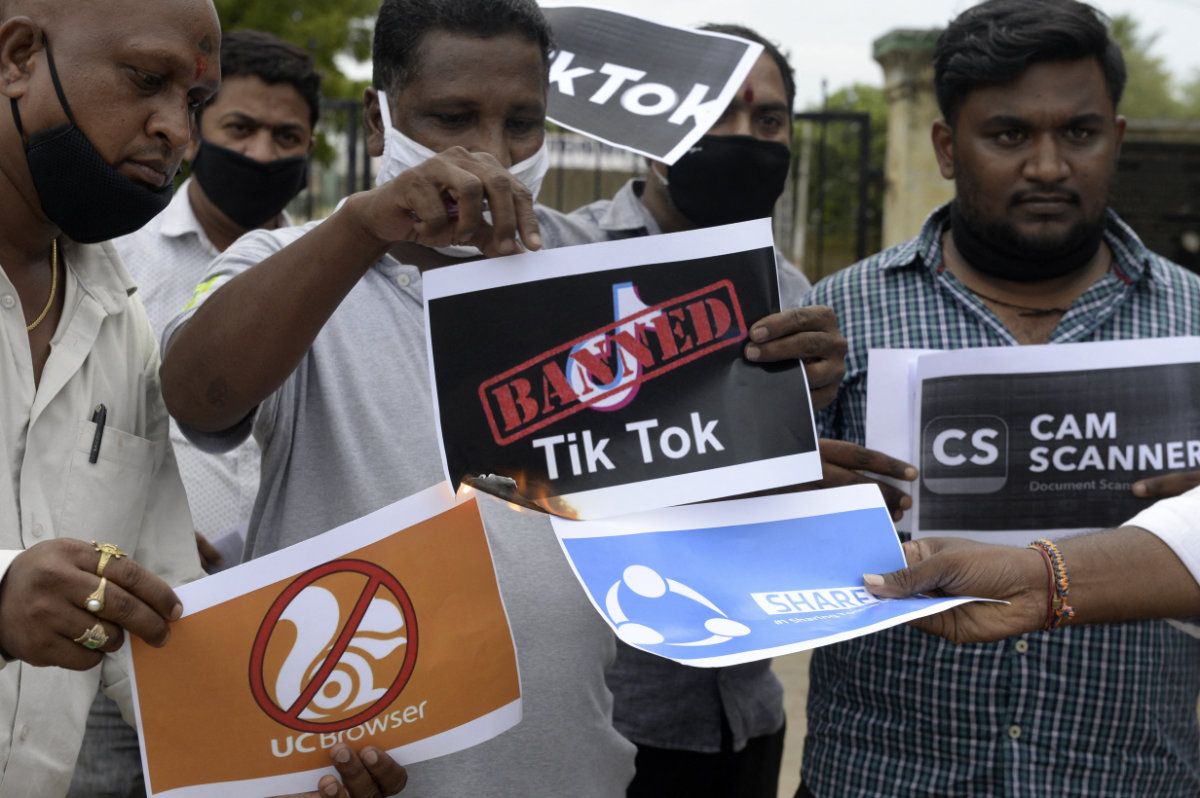
Members of the City Youth Organiztion rally in Hyderabad on June 30, 2020, in support of the Indian government's decision to ban the wildly popular video-sharing 'Tik Tok' app. (AFP/File)
In April 2024, citing national security, US President Joe Biden signed into law the Protecting Americans from Foreign Adversary Controlled Applications Act, which is an effective ban on, or forced sale of, TikTok.
TikTok has filed a lawsuit, calling the act an “extraordinary intrusion on free speech rights” of the company and its 170 million American users.
Could similar restrictions on the app now follow in Lebanon?
According to the Akhbar Al-Yawm news agency, the media office of Lebanese Minister of Telecommunications Johnny Corm issued a statement on May 8 saying a TikTok ban would first require a court order.

The Lebanese government's TikTok account has only 71,400 followers. A ban on the app may not be that much of a problem.
“At a time when social media sites are abuzz with discussions and claims related to the blocking of the TikTok application in Lebanon following its use by a gang involved in extorting minors, it is important for the office to confirm that the banning of any application, whether TikTok or others, and the blocking of websites or private applications by the Ministry of Telecommunications requires a court order in accordance with legal protocols,” it said.
“The Ministry of Telecommunications is an executive authority, and (whatever) the Lebanese judiciary (rules) in terms of banning or not banning any application, the ministry is committed to implement exclusively. There is no individual authority for the minister of communications to decide whether to ban any application or not. The ministry has the technical ability to stop and block the TikTok application. In the event of a judicial decision in this regard, the ministry will apply this decision,” the statement continued.
Corm’s office also stressed the need for parents to monitor their children’s online activity and added that there are tools in most applications, including TikTok, that allow parents to block inappropriate content.



